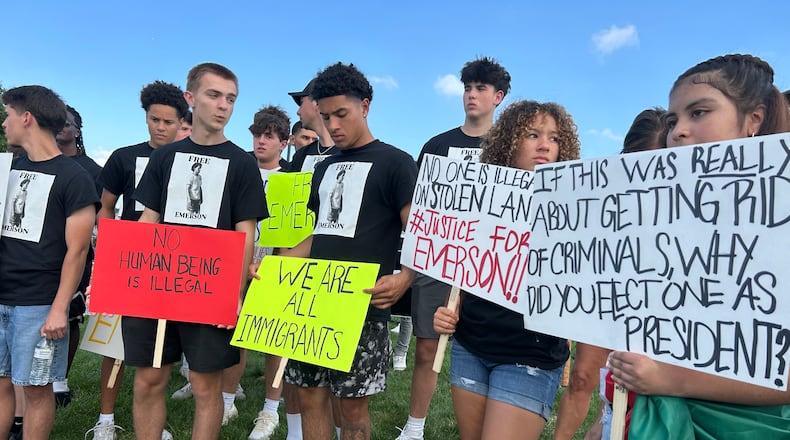Instead of arresting our neighbors who are not engaged in criminal activity our government should create paths to citizenship.
What can we do? Call our local Congressperson and Senators Husted and Moreno and
- advocate immigration reform that secures our borders AND creates a path to citizenship for many long-time law-abiding immigrants;
- advocate that ICE agents wear badges and not be masked;
- advocate that immigrants appearing for required check-ins be protected from arrest.
Call our State House member and tell them to vote “No” on HB 26 and SB 172 which interfere with local law enforcement discretion in immigrant arrest.
Support local nonprofits that advocate for immigrants, such as Cross Over Community Development and El Puente Dayton.
We can find fair ways to protect our borders without cruelty.
- Kathleen Gmeiner, Miami Township
Let’s change the paradigm. Our undocumented population can be America’s New Pilgrims. Like the original pilgrims who landed on Plymouth Rock, these people want a better life. Let’s help them.
Issue a new “Special category” of Social Security numbers for all of these undocumented adults and children. Identify each person with a color-coded Social Security card, with which these New Pilgrims may seek employment and pay withholding income tax into the system.
The special Social Security number gives these New Pilgrims the opportunity to support themselves without government assistance (i.e no benefits). No health insurance, no State Medicaid, no unemployment insurance, no government loans.
Can they get a job? Can they buy a car? Can they own a home? Yes. Can they vote in an election? No. Go to a doctor? Yes, but expect to pay.
Think of the positive outcome. Our government turns the PR and logistical nightmare of deporting people into a compassionate program of assimilation. The US economy gets a labor force ready to tackle the lowest paying jobs. Money flows into the government coffers as income tax while nothing is going out in the form of benefits.
Our government can implement this program without incurring a lot of expense. Create a few hundred government jobs to handle the millions of Social Security card applications. Add a few tech positions to monitor the separate database for this population.
Securing the southern border is still a priority but undocumented immigration for those already here is mitigated while their cases for asylum are being processed.
What have we got to lose?
Chick Fraunfelter, Middletown
After years of determined advocacy, community colleges across the nation are celebrating a long-awaited breakthrough: Workforce Pell Grants are now law. Included in the sweeping budget reconciliation bill signed on July 4, this provision allows Pell Grants — federal aid to undergraduate students with significant financial need — to be used for short-term, high-quality training programs. This is a change that will help thousands of Ohioans gain the skills they need to launch rewarding, in-demand careers.
We’re especially proud that Ohio played a key role in this achievement. Senator Jon Husted, newly appointed to his seat earlier this year, provided leadership on the Senate HELP Committee that was instrumental in advancing this important policy.
Senator Husted’s leadership comes as no surprise to those of us in education and workforce development. As Lieutenant Governor and now U.S. Senator, he has consistently championed policies that strengthen our workforce, expand opportunity and invest in students.
Clark State College joins community colleges across Ohio in thanking Senator Husted and the many members of Congress who helped turn Workforce Pell into reality.
- Jo Alice Blondin, Ph.D., President of Clark State College
Credit: JIM NOELKER
Credit: JIM NOELKER
Interested in submitting a letter to the editor? Email your submission to edletter@coxinc.com.
What makes a good Letter to the Editor?
Our Letters to the Editor are generally collected and published once a week, based on the volume and quality of submissions we receive. Letters to the Editor are short, focused submissions that quickly address a single topic. They can run up to 250 words in length.
Letters to the Editor can respond to specific issues in stories we’ve reported, other contributed columns or syndicated columnists. They’re a quick and easy way to add your perspective to the discussion of any topic.
Learn more about how to get involved with our Ideas & Voices section.

